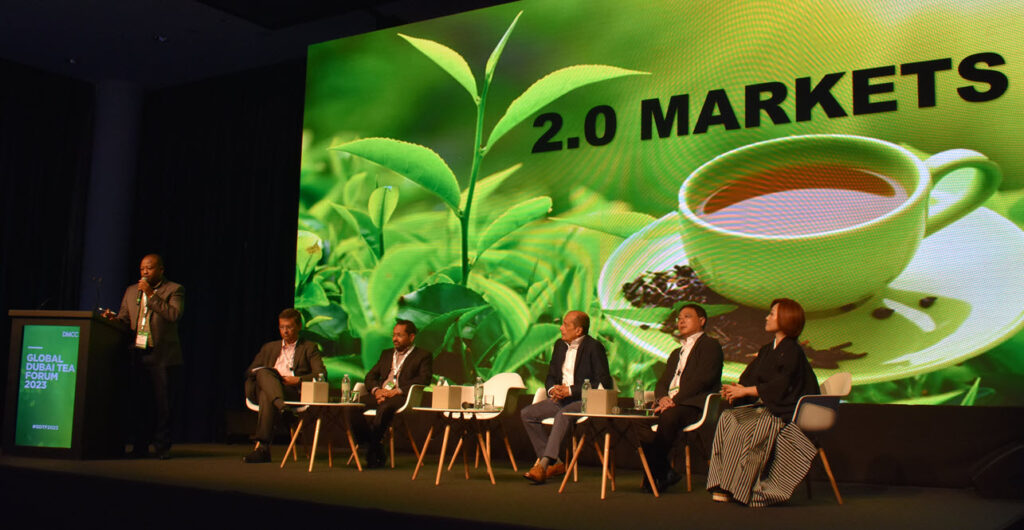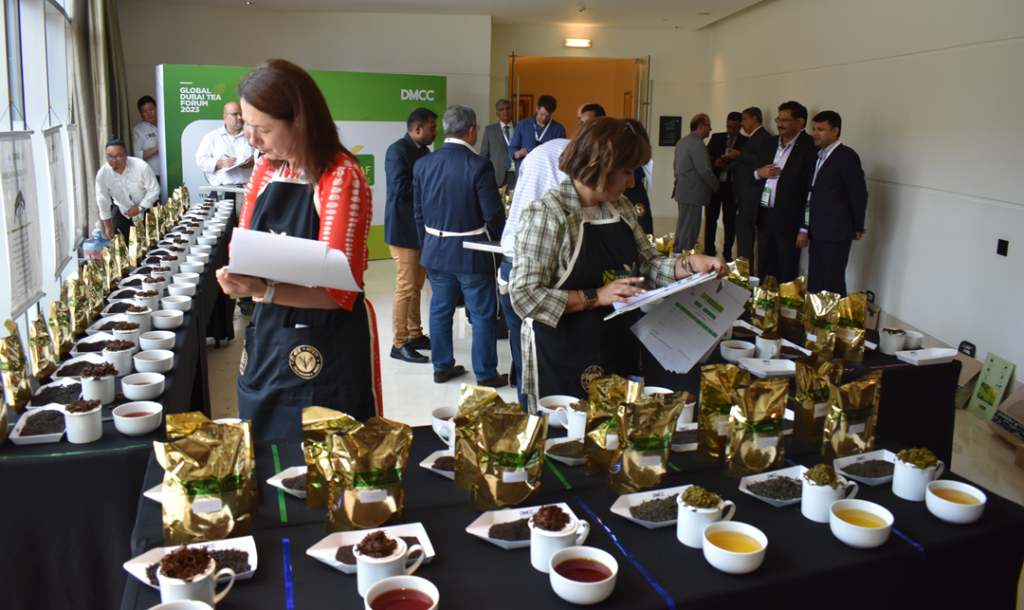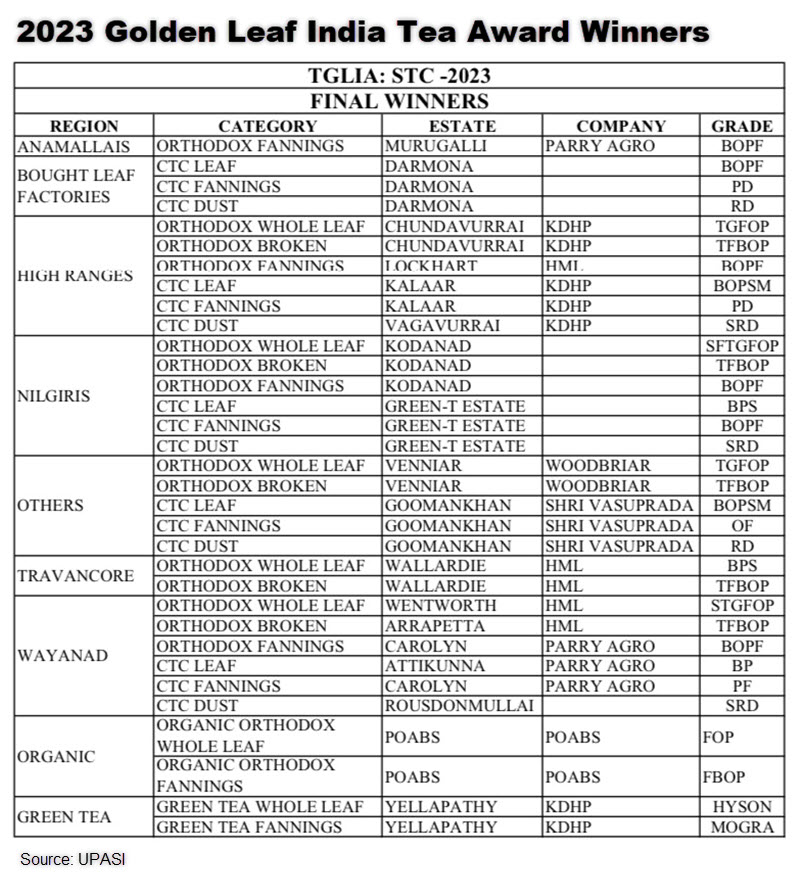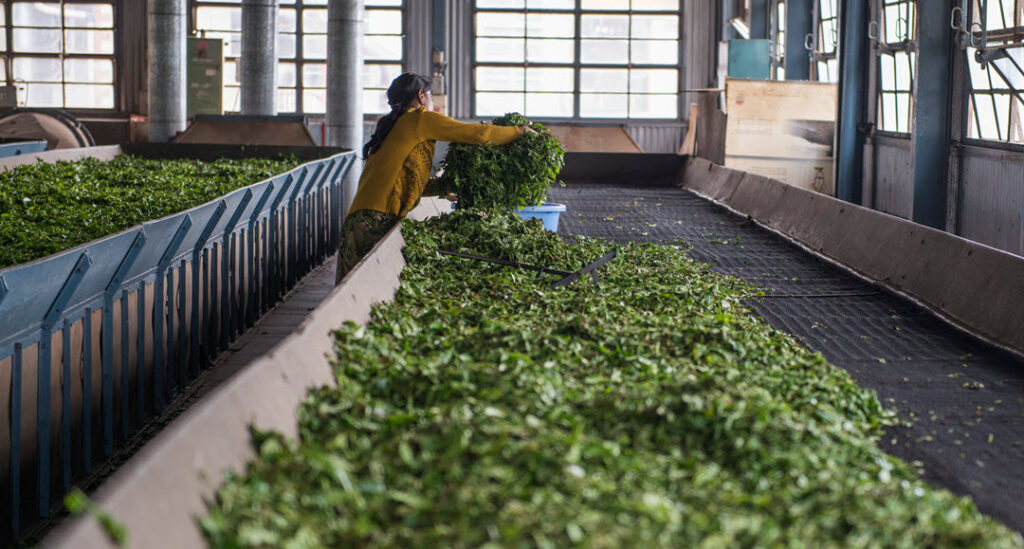
Tea News for the week ending April 28
| The Global Dubai Forum Makes a Splendid Return
DMCC Executive Chairman and CEO Ahmed bin Sulayem commits to a biennial schedule for future conferences
| South India Planters Name 18 Golden Tea Leaf India Award Winners
| Indian Tea Association Presses for a Tea Price Floor Indexed to Rising Production Costs Borne by Smallholders and Made Leaf Producers
PLUS This week, Tea Biz discusses various revealing consumer trends and beverage insights with Siân Edwards, Group Insights Manager at Finlays. She says the outlook for the beverage industry is positive, with consumers making good choices for the planet and themselves.
Hear the Headlines
Listen to Episode 114
Dubai Remains World’s Top Tea Re-Exporter
A five-year pandemic-forced hiatus lent this year’s gathering of tea executives the atmosphere of a reunion on April 25-27. Three hundred attendees got reacquainted with each other and the impressive expansion of services at the Dubai Multi Commodities Center (DMCC).
Director of Agri Commodities Saeed Al Suwaidi, named to the post in January 2022, said that the DMCC Tea Center played a major role in positioning Dubai as the world’s largest re-exporter of tea.
“We launched the tea center in 2005 to further develop and grow the trade through Dubai by connecting tea producers and merchants, allowing tea-growing countries to reach a global market,” said Suwaidi.
The tea center, which spans over 20,000 square meters, offers a business center, storage, and blending solutions. “Our machines can produce up to 45 million tea bags per month with the capacity to store up to 5000 metric tons of bulk tea at any given time,” he said
DMCC provides free storage allocation to all its members due to increasing demand. The tea center has increased its service area by 25% In recent years, accommodating new state-of-the-art machinery and temperature-controlled storage facilities for specialty teas as well.

South India Planters Name Golden Leaf India Award Winners
Eighteen tea estates took home prizes during award ceremonies at the 18th annual Golden Tea Leaf India Awards organized by the United Planters Association of South India (UPASI).
An international jury attending the Global Dubai Tea Forum selected winning teas from 118 entries in eight categories. Estates owned by Kanan Devan Hills Plantations (KDHP) won seven awards. Four estates from Parry Agro Industries and four Harrisons Malayalam estates also stepped forward to receive their prize at awards ceremonies on April 27.
Cherian George, a United Planters Association member and CEO at Harrisons Malayalam tea estates, said, “It’s been five years since judges last convened at the Global Dubai Tea Forum to select the winners. Unlike most competitions, he explained, UPASI coordinators select samples randomly.
“The coordinating committee walks across each factory and randomly* picks the sample. That’s a big differentiator. Those samples are tested blind by highly skilled brokers with great experience in the whole thing.
South India, unlike other tea-growing areas, has multi-locational tea growing. I mean, you have a mid-elevation, you have a low elevation, you have a high elevation, and each of them has got character. Some of the teas have got body, some have got strength, and some have got very high flavor.
He said preliminary screening resulted in 62 samples from 118 entries. “I don’t think we have ever brought more than 40 samples here,” said George, adding, “The Dubai Tea Forum has been very helpful in coordinating this. This time, we had some fantastic tasters globally, including Canada’s Shabnam Weber from Toronto and the UK’s Dr. Sharon Hall and Gundlach Packaging Managing Director Sanjay Sethi, based in Dubai.
So, you had a real plethora of people from multiple origins, and when they taste, it is not from one individual or one origin is multiple origins, giving complete visibility. The next phase is a special auction back home,” he said.
*The estate/factory participating in the competition should ensure a minimum lot size of 1.5 tons for Organic Tea and Green Tea, 2 tons for the Orthodox category, and a minimum of 3 tons for the CTC category.


ITA Seeks Tea Price Floor Indexed to Production Costs for Growers and Processors
The India Tea Association (ITA) has asked India’s Commerce Ministry to declare a minimum price for tea.
An ITA press release described how rising production expenses squeeze growers out of the tea market.
“According to ITA membership crop data, the Darjeeling crop is estimated to be down by 39% in March. Crop fall has been reported in the Dooars region, adding woes to the state’s ailing agro-industry. Tea prices are not keeping pace with the rising cost of production.”
Since 2014, West Bengal tea prices have registered an annual combined growth rate of around 4%, less than half the growth rates of fuel, fertilizer, and plant protection chemicals. Workers now earn Rs. 232 rupees daily, an increase of 144% from Rs. 95 rupees in April 2014.
The situation is more acute than in past years due to falling yield, the Hindu Businessline reported.
“Auction prices of Darjeeling tea have been more depressed than the overall West Bengal Average price – recording a CAGR of only 1.86% since 2014. Given that the cost of production in Darjeeling Hills is significantly higher than in the plains, most Darjeeling tea estates find it difficult to sustain operations.
ITA is seeking a floor price indexed to the cost of production payable to small tea growers and to made tea producers.
ITA writes that enforcing a floor price mechanism for smallholders selling green tea leaves offers an immediate solution to the “unremunerative price of tea” without any additional cost to the government.
State government officials in West Bengal and Assam conveyed their support in correspondence with the Ministry.
FEATURES

Conscious Consumerism
By Dan Bolton
Finlays annually publishes a beverage trends report. This year’s eighteen pages of statistics and market research revealed that consumers have growing concerns about food inflation and economic growth, but research cited in Finlays Beverage Trends 2023 indicates that consumers continue to view good tea as an affordable luxury, explains Group Insights Manager Siân Edwards.
“The desire to treat themselves, coupled with concern for their health and the planet, drives the trend toward conscious consumerism. We’re seeing how each purchasing decision is carefully evaluated regarding financial, health, and environmental cost. Throughout this report, we’ve sought to encapsulate this broad sentiment under the banner of ‘mindfulness,’ as people mindfully allow themselves indulgences, choose healthy products, and opt for brands with a lower environmental impact.”
Listen to the interview.
Share this episode with your friends in tea.
Signup to receive Tea Biz weekly in your inbox.


